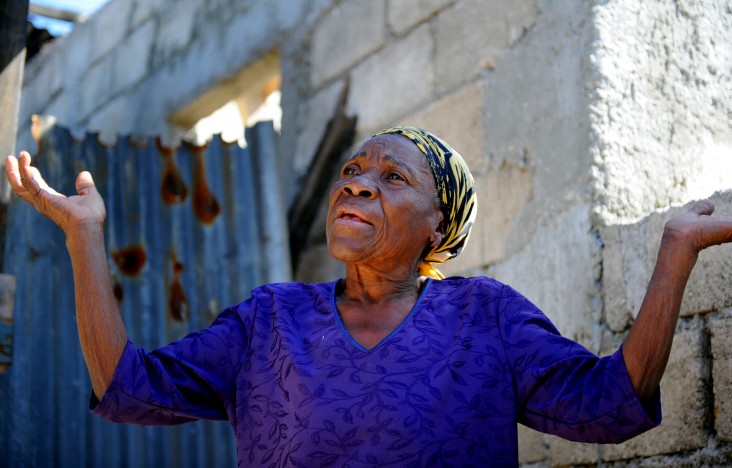
Overview
HAITI Women & Gender Fact Sheet ![]() (pdf - 179k)
(pdf - 179k)
While Haiti’s Constitution protects women from workplace discrimination as well as physical and sexual abuse, and guarantees the right to political participation, in practice women routinely face exclusion and harassment in public and private life. Women seeking political office face considerable obstacles, including patriarchal attitudes toward leadership, lack of financial support, and threats of violence and intimidation.
However, some progress has been made. In 2012, the Parliament passed an amendment instituting a 30 percent quota for women in all elected and appointed positions at the national level, and the 2015 Electoral Decree added the same quota for local councils and political candidates. Haiti's long-term economic and democratic development rely on prioritizing the protection and empowerment of women.
Key Challenges
Gender-based violence (GBV): One in three Haitian women, ages 15 to 49, has experienced physical and/or sexual violence. Moreover, poor legal protection, fear of reprisals and the social stigma attached to being a victim of sexual violence contributes to under-reporting.
Need for safe spaces in schools: Among girls, ages 13 to 17 who reported sexual abuse, school was the second most common place for unwanted touching. Of women ages 18 to 24 who received money for sex before turning 18 years old, 27 percent reported that schools were the most common location to meet people paying for sex.
Weak judicial system: Laws criminalizing rape and domestic violence were not enacted until 2005, the penal code has not been revised since 1835, and women and girls often face unequal legal protection. Sexual harassment often occurs without redress and victims frequently find themselves blamed for rape and abuse.
USAID strategy & activities
Reducing rates of GBV and empowering women requires sustained engagement through legislative action, effective law enforcement, community outreach, increased literacy, and economic empowerment. The U.S. Agency for International Development (USAID) works with the Haitian government, civil society organizations and the international community to protect women from GBV and address barriers to women’s advancement.
Access to services: Through Konbat Vyolans grants, USAID works to strengthen GBV survivor-centered support by improving access to services, including crisis support, emergency shelters and transitional housing, medical and psychosocial care, and legal aid. Through the GHESKIO grant USAID supports a holistic GBV program that provides health services, counseling, and vocational training for victims.
Strengthened networks to combat violence: USAID’s Konbat Vyolans civil society coalition including the Center for the Promotion of Women Workers (CPFO), Ayiti Nexus, and the Foundation for the Reproductive Health and Family Education (FOSREF) fosters the promotion of best practices and sharing of information among service providers and institutions to provide survivors with sustainable and effective support. GHESKIO also trains women-focused networks and promotes public awareness on GBV.
Safe school environment: USAID works with the Ministry of Education to maintain schools that are free from any refusal and bias based on gender and to promote awareness of GBV.
Key Accomplishments
Improving legislation: With support from USAID, the Haitian government passed two new laws to combat trafficking in persons and to promote responsible parenthood. In addition, the Ministry of Women’s Affairs and Women's Rights (MCFDF), with USAID support, drafted a new law on the prevention and punishment of violence against women, now pending adoption.
Connecting GBV survivors to services & institutionalizing support: USAID’s human rights project Aksyon Kolektif pou Sekirite kont Ekspwatasyon (AKSE) developed a mapping tool for child protection and sexual violence and GBV services covering 42 communes, now managed by the MCFDF and Haiti’s child welfare agency.
Expanding women’s participation in politics: USAID’s elections support project has made critical contributions to ensuring women’s participation in Haiti’s electoral process:
- Assisted the Provisional Electoral Council to draft a National Gender and Elections Strategy
- Set up a hotline for women candidates to report security issues
- Organized a Political Leadership Academy for hundreds of women from several political parties
- Collaborated with women politicians to develop an advocacy strategy to promote gender-sensitive political programs and public policies.
Connecting low-income women to legal services: Since 2011, USAID has supported legal aid to over 6,000 low-income and marginalized persons, including many victims of GBV. In 2017, USAID continues to provide legal services for the most vulnerable. In addition, USAID provides the justice system with technical assistance for the prosecution of trafficking in persons and GBV.








Comment
Make a general inquiry or suggest an improvement.